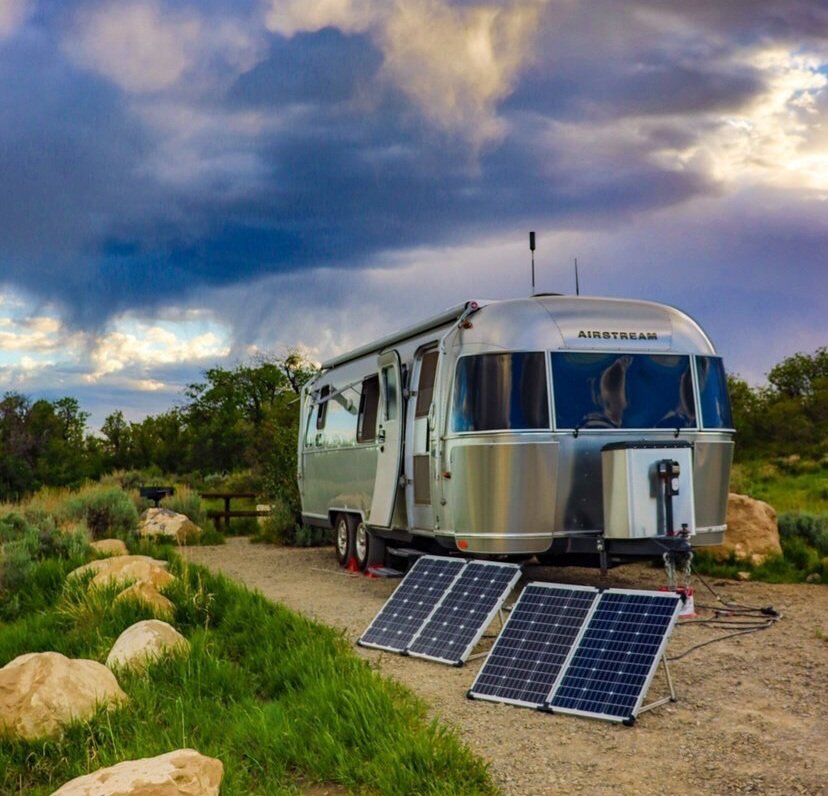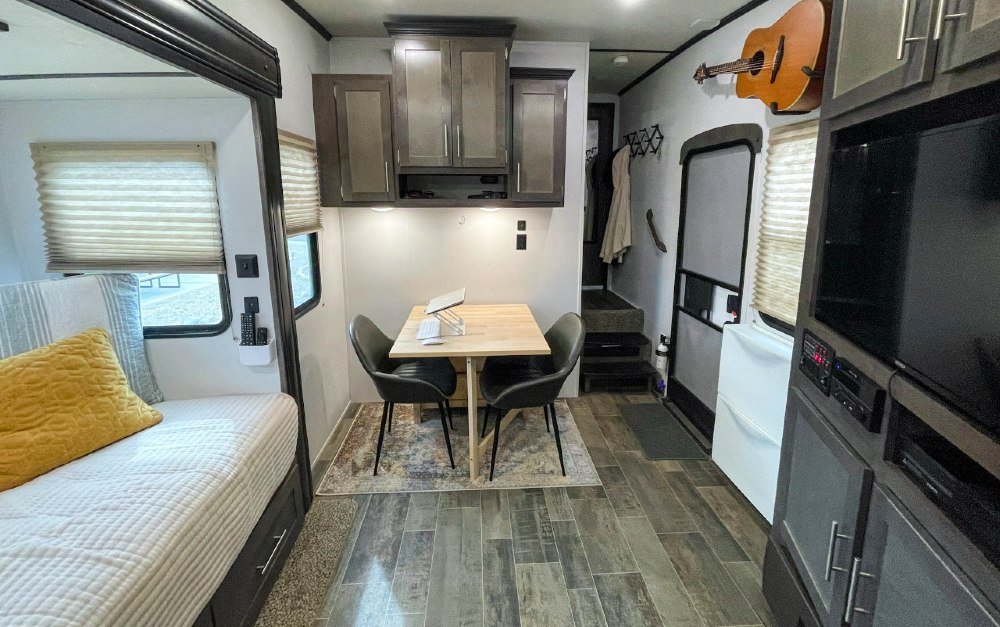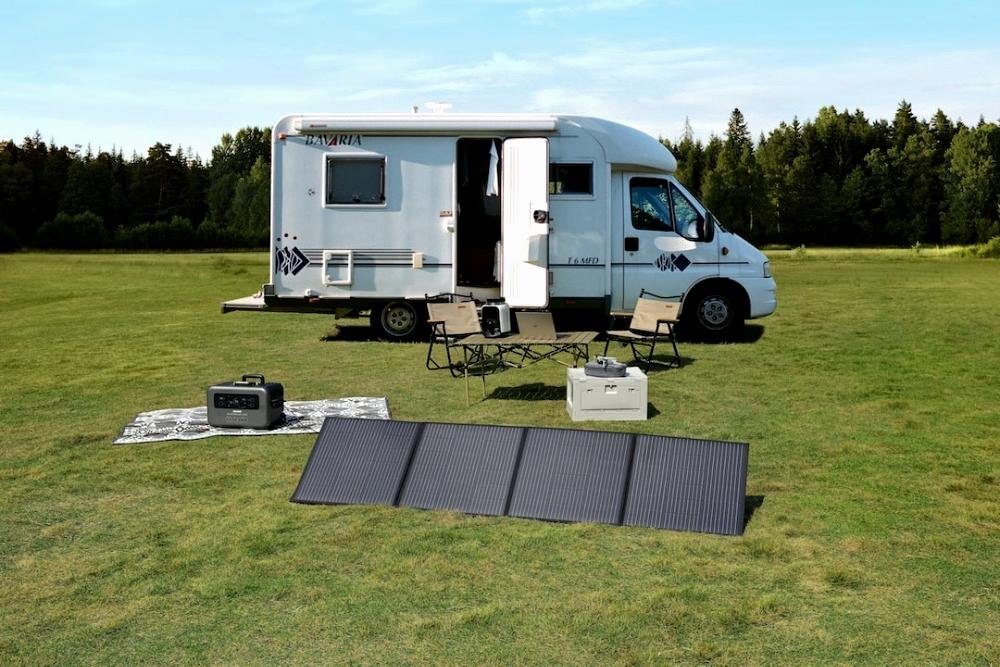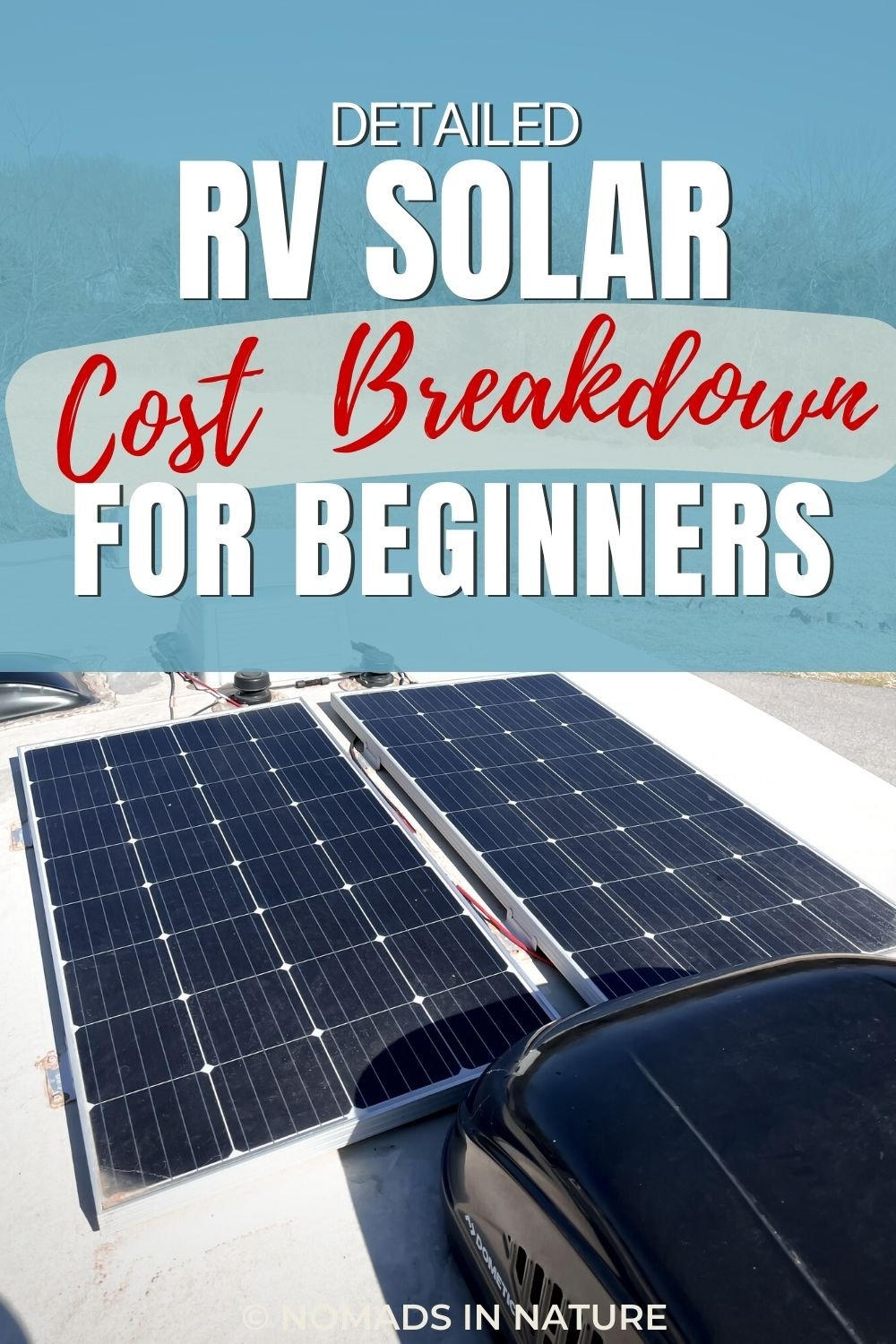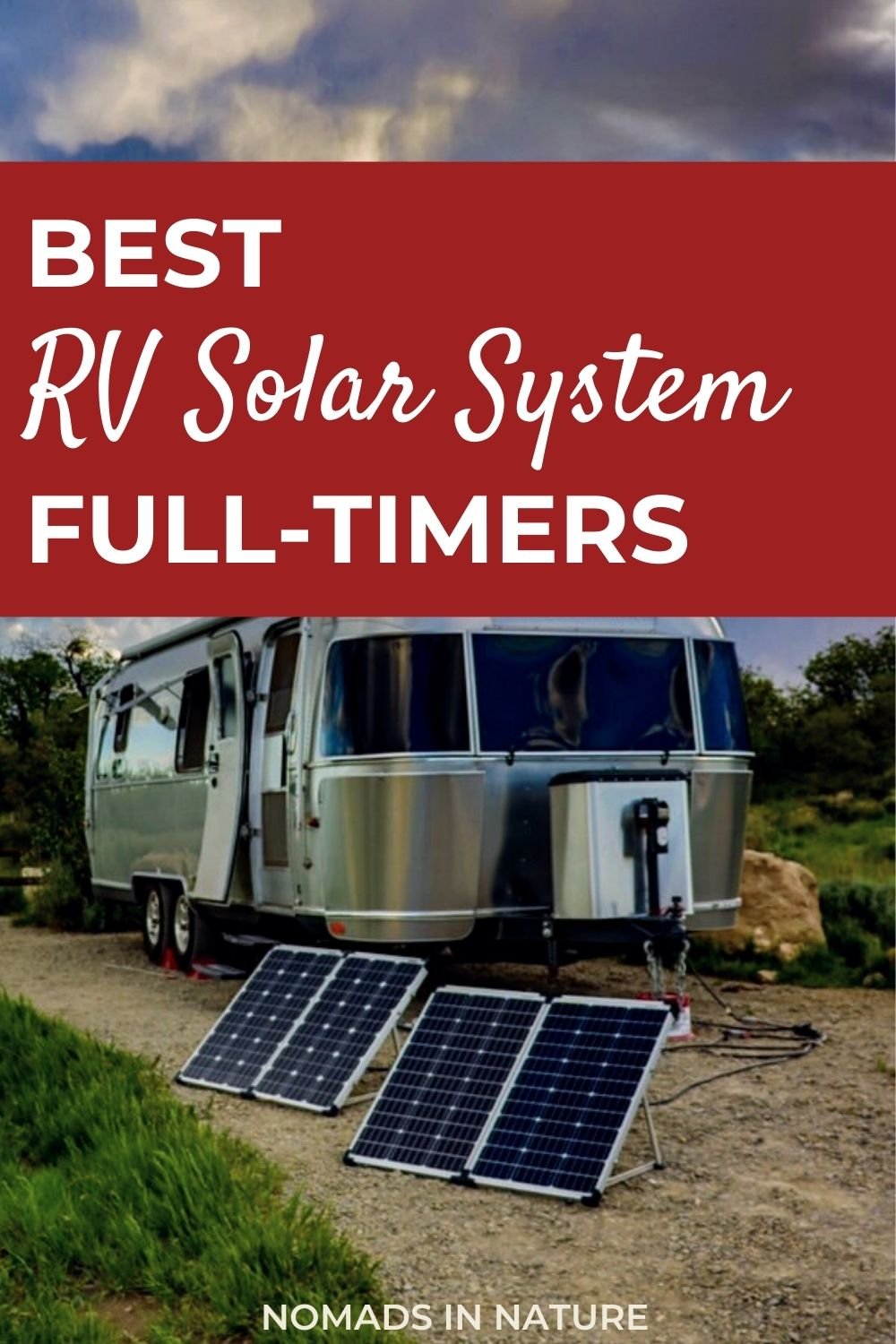Best RV Solar System for Full Time and Part-time RVers
When setting up your RV solar system, it’s good to know how many solar panels and batteries you need to power your RV so you can determine how much an RV solar system will cost.
Installing solar on RV is worth it if you ever plan to camp without RV hook-ups at any point, such as dispersed camping or at most national parks where generators aren’t welcomed.
The best solar system for an RV is one that can power your RV essentials like the heater, water pump, lights and refrigerator while you’re off grid and ideally while staying within your budget.
Below, you will find the best RV solar setup for:
image courtesy of @thisairstreamlife on IG
If you’re new to RV solar, make sure you know the basics of how an RV solar system works to help you estimate the size of your components based on your power needs.
This article will help you determine how to build the best RV solar system within your budget and needs, as well as the benefits of spending more on major components like RV Batteries.
RV solar setups come in all shapes, sizes, and prices. I have helped fellow nomads go off-grid for as little as $300, and I have seen setups that cost well over $10,000.
I have spent hundreds of hours researching and installing RV solar systems, and I’m excited to share this knowledge with you.
This page includes affiliate links. I may receive a small commission at no extra cost to you.
RV Solar System - Under $1,000
Weekend warriors looking to add solar to their RV usually don’t need all the bells and whistles that full-time RVers need.
Nor do you need to spend a lot of money on gadgets that you’ll only use a few weeks out of the year.
Rather than investing in a top of the line inverter and lithium batteries to run a microwave or blender, I recommend having a system that will allow you to use the sun to charge phones, turn on the lights, and power the jacks and slides.
Having a simple solar setup will open up many more camping options.
State and national parks rarely have electrical hookups, and a little bit of solar power can save you from having to ruin the peaceful nature with a noisy generator.
RV Solar Panel Kit:
My favorite option for a weekend warrior looking to add a little bit of solar power to their rig is the DOKIO 220W Foldable Solar Panel Kit.
For under $300, you get:
one-220W solar panel (which folds up for easy storage)
a charge controller
a 20A controller
the wiring you need to quickly connect to your batteries when you get to camp.
I have friends with this simple setup and they love how easy it is to use and how efficiently it keeps their batteries topped off.
RV Battery:
Most RVs come with a 100 amp hour (Ah) lead acid battery (similar to a car battery).
Lead acid batteries are a good, inexpensive option; but keep in mind that you should not allow these batteries to drop below a 50% charge.
Therefore, one battery will only give you 50 aH of usable power. This is enough power storage to charge a cell phone 10-15 times or have a few lights on for 20 hours.
One lead acid battery should be sufficient if you just want to keep your phones charged and lights on for an extended weekend.
Anything beyond that, you should consider adding a 2nd battery to your bank like one from the leading RV battery brand - Renogy.
Pro tip- A significant power draw that you might not think of is your furnace fan. While the furnace uses propane to create heat, it also uses a fan to circulate the heat.
Using your furnace on a cold night will draw 40-50 Ah from your battery bank, which would take a single lead acid battery down to zero.
If you plan to RV in the cold, add a 2nd battery.
RV Inverter:
While the setup above will be able to keep your batteries charged and DC appliances running, you won’t be able to run your AC appliances (anything that plugs into a normal wall outlet) without an inverter.
If you need to keep your laptop charged or you want to power up the TV, you can add a simple inverter like this 1200 watt Pure Sine Wave Inverter for around $200.
There are many low-cost options out there, but make sure you get a pure sine wave inverter.
This simple and inexpensive RV solar setup will keep you powered up while you explore nature off the grid.
Setting up this system requires no prior electrical experience as the components are all plug-and-play.
RV Solar System - Under $3,000
If you RV full-time or you like to spend multiple weeks traveling in your RV, I recommend that you add a few extra components to your RV solar system and consider some modifications that will make your life easier.
The components of this RV solar system are higher quality, which will lead to less maintenance and fewer headaches on the road.
RV Solar Panel Kit:
Buying an RV solar kit is a great option for someone trying to get quality components and make your installation easier as the parts are all compatible.
The best RV solar panel kits are made by Renogy as their solar panels are efficient, durable, and come with a 5 year warranty.
Renogy 400 watt solar panel kit
I really like this Renogy 400 watt solar panel kit because it comes with four high-quality 100 watt solar panels, an MPPT charge controller, and all of the wiring and mounting hardware that you need to get started.
You can always add more solar panels to these kits if you want. You can use this RV solar calculator if you aren’t sure how many solar panels you need for your RV.
Renogy makes a few solar panel kit options, but you will want to make sure you go with one that has an MPPT charge controller.
MPPT charge controllers are much more efficient than their PWM counterparts, and this upgrade will save you from having to get an extra solar panel.
After choosing your solar panels and charge controller, next are your batteries.
RV Batteries:
The best RV batteries for someone on a budget are Renogy lead acid batteries. If you can afford the upgrade, lithium batteries definitely have major advantages.
Renogy batteries are tested for the various conditions that RVs go through, and the ~$200 price point for 100Ah makes these a great entry-level battery.
The major downside to any lead acid battery is that you can only use 50% of the battery storage without damaging the battery.
That is why the RV solar calculator shows that you need 2X as many lead-acid batteries to get the same amount of usable power.
While the best lithium batteries are still very expensive we also include our favorite budget lithium here: 5 Best RV Batteries.
RV Inverter:
If you want to live off-grid for extended periods, you should add an inverter to your RV solar system so you can run appliances that plug into normal outlets.
Keeping with the trend, Renogy makes a great 2000 watt pure sine wave inverter for under $700.
Unlike the inverter discussed in the previous section, this one will tie directly into your RV fuse box. You may want to consult an electrician for this part, but I was able to do the wiring with a little help from Youtube.
RV Battery Monitor:
One last component of your RV solar system that will save some headaches is a battery monitor.
Renogy makes a battery monitor for under $100 which is very simple to install.
Rather than estimating your RV battery storage using a voltage reading, the battery monitor will show you real-time battery remaining percentage.
RV Solar System - Full Time RVers
If you want the best RV solar system for full-time RVing and boondocking, look no further.
There isn’t just one brand that makes the top of the line for every RV solar component and this setup below will allow you to customize your solar setup to have the top of the line RV solar panels, RV batteries, and inverter.
I’m also including a few add-ons to really bring out the bells and whistles to make monitoring and maintaining your system a breeze.
If you have the money to spend, I recommend this system 100%.
We have most of the components below (not sponsored), and we love how our system turned out.
RV Solar Panels:
Regardless of your budget, the best RV solar panels are made by Renogy, especially given their 5 year warranty.
We have four - 160watt Renogy panels, and we love them!
Depending on your budget and rooftop space, you can go with the 100W solar panels or the 175W solar panels.
If your RV has a curved surface like an airstream, you may consider the flexible solar panel option as they lighter and most importantly you don’t have to put holes in your roof, but they are considerably more expensive and not as durable.
Don’t forget the mounting brackets for the non-flexible solar panels.
MPPT Charge Controller:
Rather than using the Renogy charge controller that comes with the RV solar panel kits, our RV solar system uses a Victron SmartSolar Charge Controller as Victron makes the best RV solar accessories.
Make sure you properly size which charge controller you need by reading our post on Sizing Your RV Charge Controller.
As a reminder, a solar charger gathers energy from your solar panels, and stores it in your batteries as usable energy.
The Victron charge controller goes above and beyond by being the most efficient in the market, and allows you to read historical and real-time input/output data from your solar panels and battery.
Additionally, you can configure the solar charger settings from the app.
Best RV Batteries:
The best RV batteries are BattleBorn lithium batteries.
A few other brands are jumping into the lithium RV battery market, but BattleBorn is still the standard.
The battery management system, quality control testing, and industry leading 10-year warranty allow Battle Born Batteries to remain at the top.
While the $$ list price is a little extreme, these batteries are rated for 3000-5000 life cycles with zero maintenance required.
Unlike AGM batteries, you can use 100% of the listed storage capacity on lithium batteries without damaging them.
RV inverter:
The best value in an RV inverter currently on the market is the Victron Multiplus 12V-3000 watt inverter.
Victron makes a 5000watt inverter as well, but the additional $$ doesn’t give you much additional functionality. The main benefit of the 5000watt inverter is that you can run two large appliances at the same time.
Regardless of the model that you choose, all Victron inverters have great features for boondockers such as adaptive charging technology (to maximize the charge coming into your battery) and power assist (to give your generator or shore power a boost when under a high power load).
The Victron smart dongle is a great addition to your inverter that is worth the small price.
The dongle easily plugs into your inverter and allows you to use your phone to adjust your inverter’s settings and turn off your inverter when you don’t need it
Battery Monitor:
Now that you have the best RV solar panels, batteries, and inverter; you will want to make sure to be able to easily monitor how everything is working together.
The best way to do monitor your RV solar system is the Victron SmartShunt battery monitor.
Similar to the other Victron components, the battery monitor connects to your phone via Bluetooth, allowing you to monitor the battery bank state of charge as well as the amount of power coming into and coming out of your batteries in real time.
If you want to get really fancy, you can add the Victron touch screen monitor to install in your wall. We decided that having the phone app is enough for us.
Automatic Transfer Switch:
If your RV came with 50 amp service, you should also consider adding an automatic transfer switch.
An automatic transfer switch senses if you are plugged into shore power and disconnects from the batteries if they are not needed.
If your shore power is only 30 amp and you want to run your A/C, the transfer switch will add any battery power needed to assist the shore power.
I really like our Furrion transfer switch because it was easy to set up.
Furrion is a trusted RV electronics brand. They build their products to withstand the vibration and various climates that come with RV life.
Next, learn How to mount RV solar panels and the importance of how you decide to wire your solar panels (series vs parallel).
Let me know in the comments below if you have any specific product questions, or want our input on other RV solar setups that you are looking into.
more RV Life —
Please share this blog post!

